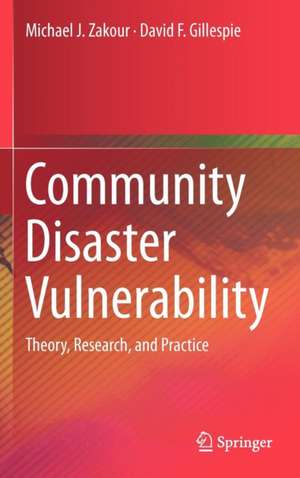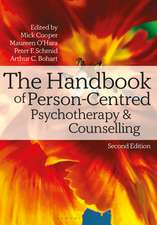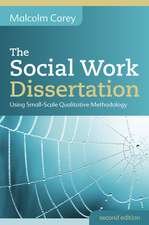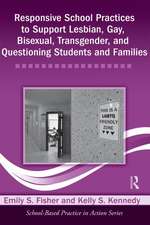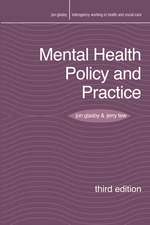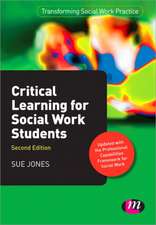Community Disaster Vulnerability: Theory, Research, and Practice
Autor Michael J. Zakour, David F. Gillespieen Limba Engleză Hardback – 13 noi 2012
| Toate formatele și edițiile | Preț | Express |
|---|---|---|
| Paperback (1) | 635.15 lei 6-8 săpt. | |
| Springer – 13 dec 2014 | 635.15 lei 6-8 săpt. | |
| Hardback (1) | 641.03 lei 6-8 săpt. | |
| Springer – 13 noi 2012 | 641.03 lei 6-8 săpt. |
Preț: 641.03 lei
Preț vechi: 754.15 lei
-15% Nou
Puncte Express: 962
Preț estimativ în valută:
122.66€ • 128.08$ • 101.29£
122.66€ • 128.08$ • 101.29£
Carte tipărită la comandă
Livrare economică 15-29 aprilie
Preluare comenzi: 021 569.72.76
Specificații
ISBN-13: 9781461457367
ISBN-10: 146145736X
Pagini: 184
Ilustrații: VIII, 180 p.
Dimensiuni: 155 x 235 x 16 mm
Greutate: 0.44 kg
Ediția:2013
Editura: Springer
Colecția Springer
Locul publicării:New York, NY, United States
ISBN-10: 146145736X
Pagini: 184
Ilustrații: VIII, 180 p.
Dimensiuni: 155 x 235 x 16 mm
Greutate: 0.44 kg
Ediția:2013
Editura: Springer
Colecția Springer
Locul publicării:New York, NY, United States
Public țintă
ResearchCuprins
Disasters and the Promise of Disaster Vulnerability Theory.- Vulnerability Theory.- The Development Perspective on Vulnerability.- Resilience Complements Vulnerability.- Cross-Sectional Design and Linear Statistics in Vulnerability Research.- Linear Accounts of Vulnerability.- Vulnerability Described Geographically.- Vulnerability Described through Networks.- Vulnerability Explored and Explained Dynamically.-Enhancing the Future of Vulnerability Theory.
Recenzii
From the reviews:
“The small book … summarizes how social scientists conceptualize, research, and approach such matters. … helpful to social workers or other professionals on the ground, with the possible exception of those who design plans for emergency response to disasters, who may find it useful as an introduction to research approaches. This may also be a useful book for those who want to enter the field of disaster research and are looking for a compact overview and an introduction to the vocabulary of the area.” (Julian Rappaport, PsycCRITIQUES, Vol. 58 (47), December, 2013)
“The small book … summarizes how social scientists conceptualize, research, and approach such matters. … helpful to social workers or other professionals on the ground, with the possible exception of those who design plans for emergency response to disasters, who may find it useful as an introduction to research approaches. This may also be a useful book for those who want to enter the field of disaster research and are looking for a compact overview and an introduction to the vocabulary of the area.” (Julian Rappaport, PsycCRITIQUES, Vol. 58 (47), December, 2013)
Notă biografică
Michael J. Zakour: Dr. Zakour earned an M.A. in Sociocultural Anthropology in 1980 from the Pennsylvania State University, an M.S.W. from Washington University School of Social Work in 1984, and a Ph.D. from Washington University in St. Louis in 1988. He taught at Tulane University School of Social Work from 1991 to 2007, where he was director of the Ph.D. in Social Work from 1998 to 2005. He currently is Associate Professor and Director of the Nonprofit and Voluntary Associations (NOVA) Institute, School of Applied Social Sciences, Division of Social Work, West Virginia University, Morgantown, WV. He has published in important social work journals such as the Journal of Social Services Research, Social Work, Social Work Research, Nonprofit and Voluntary Sector Quarterly, Social Development Issues, Reflections, and the Journal of Social Work Education. In 2000, he was Editor of Disaster & Traumatic Stress: Research and Intervention, which is a monograph in the series Tulane Studies in Social Welfare. He has also published numerous chapters on disaster social work. He is currently co-PI on a research project on the evacuation of persons with disabilities, funded by the National Institute on Disability and Rehabilitation Research, through the U.S. Department of Education. David F. Gillespie. Dr. Gillespie earned his Ph.D. in Sociology from the University of Washington in Seattle. He is currently Professor of Sociology in Social Work at the George Warren Brown School of Social Work, Washington University in St. Louis. He has undertaken studies for a number of government, non-profit and private organizations, including the National Science Foundation, the Health, Education and Welfare Department, the American Red Cross, and Union Electric Company. His research has been primarily focused on community dynamics and networks of interorganizational relations for disaster preparedness. He haspublished several books and numerous papers on organizations and research methodology.
David F. Gillespie. Dr. Gillespie earned his Ph.D. in Sociology from the University of Washington in Seattle. He is currently Professor of Sociology in Social Work at the George Warren Brown School of Social Work, Washington University in St. Louis. He has undertaken studies for a number of government, non-profit and private organizations, including the National Science Foundation, the Health, Education and Welfare Department, the American Red Cross, and Union Electric Company. His research has been primarily focused on community dynamics and networks of interorganizational relations for disaster preparedness. He has published several books and numerous papers on organizations and research methodology.
David F. Gillespie. Dr. Gillespie earned his Ph.D. in Sociology from the University of Washington in Seattle. He is currently Professor of Sociology in Social Work at the George Warren Brown School of Social Work, Washington University in St. Louis. He has undertaken studies for a number of government, non-profit and private organizations, including the National Science Foundation, the Health, Education and Welfare Department, the American Red Cross, and Union Electric Company. His research has been primarily focused on community dynamics and networks of interorganizational relations for disaster preparedness. He has published several books and numerous papers on organizations and research methodology.
Textul de pe ultima copertă
Large-scale disasters--Hurricane Katrina, the 2004 tsunami, the BP oil spill--are enduring reminders of the fragility of our natural resources, our built environment, and our human communities. Particularly apparent is how much longer recovery takes for some survivors than others--and that some never recover at all.
Community Disaster Vulnerability offers a deeply nuanced understanding of how disasters affect at-risk populations such as the poor and the elderly, beginning with factors that contribute to disaster risk. Its focus on the complex layers of disruption caused by disasters links research findings across disciplines and levels of intervention. Concepts and models are included that systematically explain the sociopolitical aspects of disasters and identify relevant interventions for bolstering community resilience, providing social support, and distributing post-disaster resources. These practical applications of the theory propose methods of proactive planning for and responses to natural, manmade, or hybrid crises. This far-reaching volume:
Community Disaster Vulnerability offers a deeply nuanced understanding of how disasters affect at-risk populations such as the poor and the elderly, beginning with factors that contribute to disaster risk. Its focus on the complex layers of disruption caused by disasters links research findings across disciplines and levels of intervention. Concepts and models are included that systematically explain the sociopolitical aspects of disasters and identify relevant interventions for bolstering community resilience, providing social support, and distributing post-disaster resources. These practical applications of the theory propose methods of proactive planning for and responses to natural, manmade, or hybrid crises. This far-reaching volume:
- Introduces a general framework for disaster vulnerability theory.
- Explains social development and resilience perspectives as they relate to vulnerability theory.
- Illustrates the use of geographic methods in describing the locations, depth, and extent of disaster vulnerability.
- Examines cross-sectional research designs and linear statistical models in community disaster vulnerability research.
- Applies a system dynamics simulation model to disaster policy and planning.
- Features a detailed model of vulnerability and resilience factors in disasters.
Caracteristici
The first volume to combine vulnerability research with social work practice Integrates vulnerability and resiliency theories within a stress and coping framework Presents material covering a wide spectrum from the individual to the societal levels Offers research design methods
